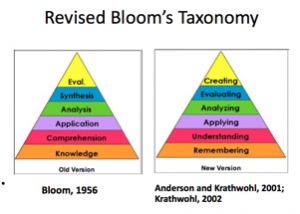Disclaimer: The views and opinions in the post are mine and not those of the students, faculty, staff, administration, Board of Education or parents of my school district.
The March 30th #flipclass chat discussing in the words of @guster4lovers “Grades and Stuff” got me thinking more about grades. The nice thing about recent chats is the “required” flash blog about the topic. Doing this post started to help knock off the doldrums of winter and the long march to Spring Break. Saying all of this got me to realize a few things, Most of our students are still playing the game of school…the one of compliance and completion. Secondly, grades are not the issue…but the assignments. Whether you grade using scores and associated letters or standards (scale 1-4) it comes down to the assignment. Finally, getting the students to want learn. I say this because in the words of Dan Meyers in his TED talk… “I sell a product to a market that doesn’t want it, but is forced by law to buy it.” I teach a class called General Chemistry. It is a class composed of At Risk students (ELL, SPED, 504, socio-economic, etc.) that are required to take a Chemistry or Physics class to get a state endorsed diploma. These students have been pounded all of their academic life with the compliance, completion and worksheet system.
From: https://residentretention.files.wordpress.com/2013/05/sign.jpg
So what to do about this in my classes? To begin with we have changed the way we do experiments. We still do small scale experiments so students can get the basics of what is going on in the reactions or processes. However, we do a couple of other things when possible. First, we scale up the experiments to “Mythbuster” proportions. (Examples). Second this year the students have to film different reactions. In the demonstrations the students do the reactions but also explain what is happening. These short video demos with be posted later this year. I feel with a little more refining this will be great for the application part of chemistry.
Now comes the hard part. How do I make meaningful assignments that help the students to first get the content knowledge which may or not be present. Secondly, these assignments also have to meet the new requirements of the Next Generation Science Standards and the test that will follow but also include the current state standards until the NGSS is adopted in Michigan. Thirdly, now the state of Michigan is moving to the SAT and all that is involved its requirements. Finally, how do these assignments grab the students attention and hold it.
Frankly, I am concerned about the first and fourth requirements. In this world of ed reform and testing we are sent many messages. The tests don’t matter but they do. If you teach the material and skills the tests will follow but now the tests aren’t testing content. But the colleges want students that have a firm foundation in the content. In the end it becomes just a bunch of radio static. (This rant is for another post)
From: http://www.washingtonpost.com/blogs/answer-sheet/files/2012/11/tests.png
Adding to this dilemma is that my school wants us to move to a new grading scale. This scale would be 80% assessments (remember tests don’t matter) and 20% other. Currently, 45% of my grades are assessments (tests and quizzes), 30% lab, 15% projects, and 10% homework. Some people have told me that I can just move labs over and it will be fine. However, I use labs for learning and not assessments. The homework is basically a compliance grade. (This too is for another post)
Thus, what makes a good assignment or task or assessment? Is the assignment to reenforce and/or assess content. Does it also show that the student can apply the content or concept being taught? Does it also take previous knowledge add it to the new material and help the student show critical thinking about it? I would have to say it all of it at the appropriate times. I want to get away from compliance grades. I would say it would have to also related to Bloom’s Taxonomy and Bloom’s Revised Taxonomy.
From: http://www.designingforlearning.info/images/tip75_clip_image002.png
Finally, any assignment has to meet Michigan High School Content Expectations (for General Chemistry) and where applicable the NGSS. At this point I am not offering any total solution to my dilemma but a starting point for me to think about how I create my assignments to make them more meaningful, applicable and not playing the game of school. I hope to have set ready to share with you next week. Stay tuned.




No matter what grading system we use, I believe it’s important to emphasize learning over grades/points. The cultural shift can’t just happen within our own classrooms and our own students. Teachers who use zeros as weapons to get students to turn in work are missing the point – and yet we know that our students will face this in other classes and in college – the “No Tolerance” policy. So work for my class gets neglected in favor of assignments that are due tomorrow or it’s a zero.
I’m curious to follow how the school’s new policy will work out for you and your students. I am fully confident that you will find a way to work within the parameters and make it a positive experience for your learners!
JMaze
This is very true or many teachers, me included. I teach US History and have been thinking how to make their experience (that is what I try to make learning for my students) more meaningful, connected, real, authentic and fun. I want their learning to be something they would pay admission for (thank you TEACH LIKE A PIRATE @daveburgess).
With the “game of school” as you so perfectly point out, they don’t get much of an experience because all the “we have to do this” stuff (grades, assignments, standardized assessments, etc) gets in the way. When there is none of those things and the learning is an experience, the learning is deep, strong and remembered.
Isn’t that exactly what we are being asked to do? But the method which we are being asked does not do the same thing. If we wanted people in the real world to remember an experience wouldn’t we hear more about quizzes being handed out after ball games, recitals, concerts, races, movies, etc. Wouldn’t we want to be sure people remembered their time there?
Keep up the great work. I enjoy watch you think and enjoy seeing I am not alone.